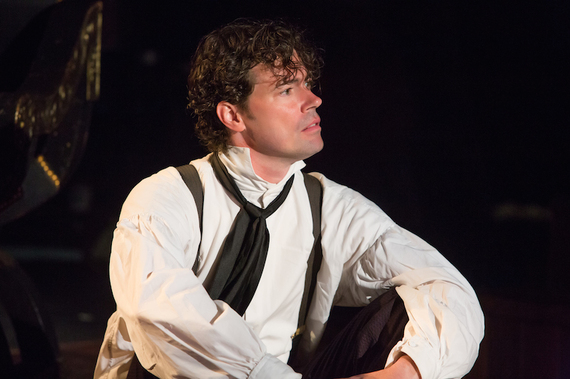Edwin, The Story of Edwin Booth attempts to examine Edwin's family influences as a kind of memory play. Booth seemed destined to be an actor, being raised in a family of Shakespearean actors; his two brothers and father were celebrated across the United States in the mid-1800s. They competed for the limelight, but the most notorious was youngest brother John Wilkes Booth, who is best known for the awful act of assassinating President Abraham Lincoln.
The musical is set on January 3, 1866 -- just before Edwin is to appear in a production of Hamlet. Along with the normal concerns of performance, Edwin has to deal with the public opinion of his brother's horrific deed and its effect on the family name and reputation.
There is much to admire in this production, particularly the wonderful performers who recite Shakespeare eloquently, sing beautifully, and act convincingly. It is a pleasure to hear their voices in speech or song. The cast includes the handsome Dana Watkins as Edwin; Paul DeBoy as Edwin's father, Junius; Adam Bashian as Junius, Jr. (called June); Todd Lawson as Johnny (John Wilkes Booth); Deanne Lorette as Edwin's mother, Mary Ann; Patricia Noonan as Mollie, Edwin's wife; and Ben Mayne as Rob. Although all are talented, I felt especially carried away by the clarity of Deanne Lorette's voice and the sweet ease of Patricia Noonan's singing.
The costumes in richly textured fabrics are designed by David Zyla. Appropriate fashions of the time (like hoop skirts in striped taffeta) and beautifully crafted stage outfits (like Hamlet's velvet suit) add a level of luxury to the otherwise spare visual production. The tasteful set, designed by Chad McArver, is a stage-like, raised wooden platform against a curtain backdrop, with two chairs suggesting Shakespearean thrones. Otherwise, just a few chairs and occasional pieces of furniture indicate the various locations, like dressing rooms. Director Christopher Scott uses the space well, having the actors move for dramatic effect or just creating activity that keeps the stage from being static. Since no choreographer is mentioned, I assume that Scott devised the simple, pleasant, dancelike movements for some of the musical numbers.
Edwin is called a musical, and there are several fine songs composed by Marianna Rosett with lyrics by Eric Swanson. The orchestra of only three members (piano, Evan Alparone; bass, Dara Bloom; and violin/viola, Ljova Zhurbin) provides pleasurable backup. I particularly liked the musical moments when Junius, the father, mentors the young Edwin, singing in a tango rhythm, and the rousing harmony of the men's voices when the brothers perform together in Julius Caesar.
But there is a lot of dialogue for a musical, and much of it, unfortunately, seems to go nowhere dramatically. (Although there is an amount of information that made me want to read a history of the Booth family.) It would seem appropriate for a family of Shakespearean actors to recite bits of Shakespeare, and they do often, which is sometimes amusing or comments on the action -- but whole scenes are played out. By themselves, the scenes are effective and may make sense, but they also dilute the drama of Edwin Booth -- whatever drama there is. I found the entire first act to be slow and lacking any emotional resonance. I couldn't connect to any dramatic thread or to any character. The second act seemed a little more coherent and more emotionally satisfying.
The braiding of the past and present has been used touchingly in dramas, but here it's often just confusing. I wasn't always sure of the timing of various scenes. While it may be clever to have Edwin's father play the ghost of Hamlet's father, in many scenes I wasn't sure if Junius was alive in the present or was supposed to be a ghost in Edwin's mind. It also took me a while to understand that Mollie had actually been Edwin's wife. The creators of the show seemed to have gotten tangled up in their attempt to be non-linear but historically accurate at the same time. In any case, I felt entangled, working too hard to figure out the point of many scenes.
As I said previously, there is much to admire in this musical, but it feels more like a first draft or a workshop. The program mentions that this is a "first run," as well as a limited run. I hope this means there will be more work done on the play. There is so much interesting material which still needs to be fashioned into more of a drama with multi-layered characters, and less of a series of historic anecdotes. I think there's a worthwhile musical in there somewhere, and if there is a revised production one day, I suggest mounting it with the same cast.
_________________________
Edwin, The Story of Edwin Booth; First preview September 4, opened on September 8, closes on September 18, 2016 at the Theatre at Saint Clement's, 423 West 46th Street, NY. Book and lyrics by Eric Swanson; music by Marianna Rosett; directed by Christopher Scott; scenic and lighting design by Chad McArver; costume design by David Zyla; musical director: Evan Alparone; orchestrations: Ljova Zhurbin; production stage manager: Maxine Glorsky. Presented by Great Circle Productions, Inc. Cast: Dana Watkins, Adam Bashian, Paul DeBoy, Todd Lawson, Deanne Lorette, Ben Mayne, Patricia Noonan.
Cover: Dana Watkins as Edwin Booth; photo: Jeremy Daniel
_________________________
Sheila Kogan is a Contributing Writer for ZEALnyc and writes frequently on theater, dance and other cultural events.
For more theater-related features read:
For all the news on New York City arts and culture, visit ZEALnyc Front Page.

